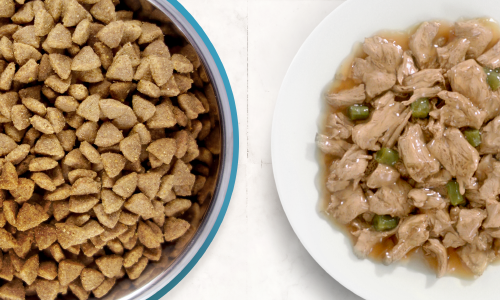Practice Scenario

Meet SOPHIE
A 5-year-old, spayed-female, mixed-breed cat
- Sophie is in hospital today for a routine wellness examination. Her body condition score is 5/9, which is consistent with previous visits.
- Although Sophie has always been healthy, her owner is concerned about Sophie’s risk for lower urinary tract disease.
- Sophie is an indoor-only cat that eats mostly dry cat food, although she receives occasional treats of canned food.
Choosing a Pet Food
Choosing to Feed Wet or Dry Cat Foods
When feeding cats, many options are available, including a variety of different flavors, and also a choice of feeding wet or dry foods, or a combination of both.
Cat food should be

Key Messages
- Benefits of feeding wet cat food:
- Typically packaged in small servings (cans or pouches) making it easy to offer a variety of flavors. For some, small servings may also help with portion control.
- Helps increase total water intake, which can be helpful for cats with lower urinary tract issues, some senior cats, and cats prone to constipation.
- Easier to chew, which can be beneficial in older cats or those with missing teeth.
- Benefits of feeding dry cat food:
- Convenience – due to the low moisture content, dry food can be left out for cats to nibble throughout the day (less risk of deterioration, especially in hot weather). Ideally cats should be given the daily feeding amount, but if feeding free choice, monitoring their body condition will help ensure they do not become overweight.
- Crunchy kibbles can help reduce tartar and plaque build-up on cats’ teeth.
- Value – dry food typically comes in larger pack sizes containing multiple feedings and has a longer shelf life, which makes it cost effective to feed.
- Benefits of feeding both wet and dry cat food:
- Mixing wet and dry cat food for a meal or feeding them as separate meals provides variety in the diet (cats are neophiliacs – they appreciate novelty).
- Helps ensure cats get plenty of moisture plus the dental benefits of dry food.
- Accustoms the cat to variety in case health issues necessitate feeding one or the other in the future.

"As long as the food is complete and balanced to meet your pet’s needs, neither wet nor dry commercial cat food is nutritionally better than the other. They both provide unique benefits. Your cat may have a preference for wet or dry food or may like being fed a combination."
To Share With Pet Owner:
Evaluating Your Cat’s Body Condition
Assess your cat's Body Condition in just 3 simple steps.
